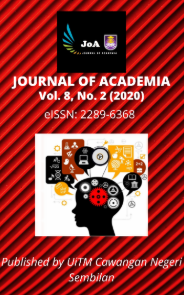RELATIONSHIP BETWEEN SLEEPING QUALITY AND BEHAVIOURAL OUTCOMES OF UiTM SEREMBAN 3 STUDENTS
Keywords:
sleeping quality, behavioural outcomes, college studentsAbstract
Purpose: To examine the relationship between sleeping quality and behavioural outcomes of UiTM Seremban 3 students. Methods and sample: A quantitative approach using a modified questionnaire of Pittsburgh Sleep Quality Index Score was employed to examine the sleeping quality and modified version of the Adolescent Behavioral Checklist was used to obtain the response on the behavioural of UiTM Seremban 3, students. 428 respondents from three (3) faculties in the Seremban campus participated in this study. Findings: The result shows that there is a significant relationship between sleeping quality and behavioural outcomes of the students (r=.118, p<0.05). Discussion and Conclusion: This study revealed that there is no significant relationship between sleeping quality and positive behavioural outcomes. However, the result indicated that there is a weak relationship between sleep quality and negative behavioural outcomes. The behaviours of the respondents tend to become more negative if they were having poor quality of sleep. The results also suggest that poor sleep quality is not only prevalent among college students but are also associated with negative behavioural outcomes. Therefore, sleeping quality should be considered in the management of students’ health and there is a need for an investigation for possible intervention on sleeping quality of the college students.
References
Buboltz Jr, W. C., Brown, F., & Soper, B. (2001). Sleep habits and patterns of college students: a preliminary study. Journal of American college health, 50(3), 131-135.
Buysse, D. J., Reynolds Iii, C. F., Monk, T. H., Berman, S. R., & Kupfer, D. J. (1989). The Pittsburgh sleep quality index: A new instrument for psychiatric practice and research. Psychiatry Research, 28(2), 193-213. doi:http://dx.doi.org/10.1016/0165-1781(89)90047-4
Enders, C. K. (2003). Using the expectation maximization algorithm to estimate coefficient alpha for scales with item-level missing data. Psychological methods, 8(3), 322.
Gradisar, M., Gardner, G., & Dohnt, H. (2011). Recent worldwide sleep patterns and problems during adolescence: a review and meta-analysis of age, region, and sleep. Sleep medicine, 12(2), 110-118.
Healthy People. (2015). 2020 Topics & Objectives. Sleep Health. . Retrieved from http://www.healthypeople.gov/2020/topics-objectives/topic/sleep-health
Jiang, X.-L., Zheng, X.-Y., Yang, J., Ye, C.-P., Chen, Y.-y., Zhang, Z.-G., & Xiao, Z.-j. (2015). A systematic review of studies on the prevalence of insomnia in university students. Public health, 129(12), 1579-1584.
Komada, Y., Abe, T., Okajima, I., Asaoka, S., Matsuura, N., Usui, A., . . . Inoue, Y. (2011). Short sleep duration and irregular bedtime are associated with increased behavioral problems among Japanese preschool-age children. The Tohoku journal of experimental medicine, 224(2), 127-136.
Krejcie, R. V., & Morgan, D. W. (1970). Determining sample size for research activities. Educational and psychological measurement, 30(3), 607-610.
Lee-Chiong, T. L. (2005). Sleep: a comprehensive handbook: John Wiley & Sons.
Liu, X., & Zhou, H. (2002). Sleep duration, insomnia and behavioral problems among Chinese adolescents. Psychiatry Research, 111(1), 75-85.
Lund, H. G., Reider, B. D., Whiting, A. B., & Prichard, J. R. (2010). Sleep patterns and predictors of disturbed sleep in a large population of college students. Journal of adolescent health, 46(2), 124-132.
Matricciani, L., Olds, T., & Petkov, J. (2012). In search of lost sleep: secular trends in the sleep time of school-aged children and adolescents. Sleep medicine reviews, 16(3), 203-211.
National Sleep Foundation. (2019). What is Good Quality Sleep? Retrieved from https://www.sleepfoundation.org/press-release/what-good-quality-sleep
Pallos, H., Gergely, V., Yamada, N., Miyazaki, S., & Okawa, M. (2007). The quality of sleep and factors associated with poor sleep in Japanese graduate students. Sleep and Biological Rhythms, 5(4), 234-238.
Peltzer, K., & Pengpid, S. (2016). Sleep duration and health correlates among university students in 26 countries. Psychology, health & medicine, 21(2), 208-220.
Sweileh, W. M., Ali, I. A., Sawalha, A. F., Abu-Taha, A. S., Sa'ed, H. Z., & Al-Jabi, S. W. (2011). Sleep habits and sleep problems among Palestinian students. Child and adolescent psychiatry and mental health, 5(1), 25.
Downloads
Published
Issue
Section
License
Copyright (c) 2020 Journal of Academia

This work is licensed under a Creative Commons Attribution-NonCommercial-NoDerivatives 4.0 International License.












